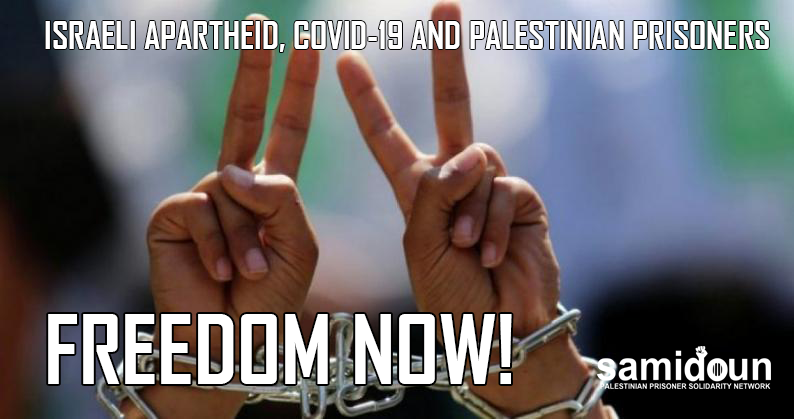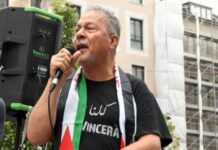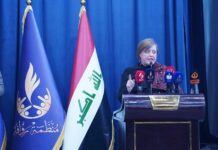
Palestinian prisoners and human rights organizations have expressed serious concerns about the threat of coronavirus inside Israeli prisons. Amid the COVID-19 pandemic, Palestinian prisoners are already suffering from severe conditions of medical neglect and denial of adequate health care. The Israeli response to the coronavirus pandemic has been characterized by the racism and repression inherent in the settler-colonial, apartheid project, denying Palestinian rights and intensifying attacks against the prisoners while failing to provide any meaningful protection against infection.
Palestinian prisoners are continuing their struggle to confront Israel’s apartheid COVID-19 response that poses a threat to Palestinian prisoners and, indeed, all Palestinians. No Palestinian prisoners have yet been diagnosed with coronavirus, but their conditions of confinement present a serious concern.
The Palestinian Prisoners’ Society announced that prisoners plan to close their sections and return meals on Friday and Saturday, 20 and 21 March, in protest against the punitive measures carried out against them in the name of infection control while they are denied real resources to help prevent the spread of coronavirus. Palestinian prisoners are instead demanding full sterilization, disinfection and cleaning of the prisons as well as proper health treatment for all detainees.
Samidoun Palestinian Prisoner Solidarity Network emphasizes the urgency of a global response to COVID-19 that focuses on solidarity, mutual aid and public health, rather than capitalist values of exploitation, oppression and marginalization of the must vulnerable. We reiterate our long-standing call for the immediate release of all Palestinian prisoners in Israeli jails, at severe risk in this time of pandemic, and especially administrative detainees, sick and elderly prisoners, and child prisoners. Defending public health must mean freedom for Palestinian prisoners, freedom for Palestine, and freedom for all oppressed peoples and nations.
Denial of access to sanitary supplies
As noted by Addameer Prisoner Support and Human Rights Association, “prisons are over-crowded, rooms, cells and sections are small, and lack proper ventilation…lack sterilizers, cleaning materials, and medications such as antibiotics and necessary nutrition.” While Addameer noted that some prisoners had been supplied with cleaning materials, other prisoners were further denied access to sanitation equipment.
The Israeli prison administration reportedly barred Palestinian political prisoners from purchasing 170 different items from the “canteen” or prison store, including cleaning solutions. The Palestinian Prisoners’ Society said that cleaning materials, fresh and frozen vegetables, meat, fish, oil and herbs were also withdrawn from the “canteen.” It raised particular concerns that this is a further attack on Palestinian prisoners taking place while they are further isolated due to the coronavirus pandemic.
Denial of family visits
Palestinian prisoners have been denied family visits according to the order of the Israeli Ministry of Public Security, Gilad Erdan – the same Israeli official who has gone on an international smear campaign against Palestinian and international human rights organizations defending Palestinian prisoners, and who earlier declared that “we must make conditions worse” for Palestinian prisoners and reduce living conditions to the “minimum required.”
This restriction applied equally to all Palestinian prisoners, including the approximately 180 child prisoners held in Israeli prisons, who are being denied family visits alongside their adult fellow detainees.
The International Committee of the Red Cross announced that visits would be suspended for a further week, depending on developments in the coronavirus outbreak. However, while family visits are being denied, the Israeli occupation is providing no alternate method for Palestinians to contact their families, such as phone calls. Instead, COVID-19 is being used as a mechanism to further isolate and punish Palestinian prisoners.
The apartheid nature of this restriction is readily apparent in the fact that Israeli civil and criminal prisoners, unlike Palestinian political or “security” prisoners, are allowed to receive family visits despite the COVID-19 crisis, according to Al-Mezan. While these visits must be conducted with a glass barrier, Palestinian prisoners routinely are forced to receive visits with the glass barrier in place without the pandemic threat.
Denial of legal visits
Addameer documented the extensive denial of access to legal counsel being imposed on Palestinian prisoners under the pretext of COVID-19 prevention. While detainees under interrogation were denied access to their lawyers, interrogators were not denied access to the detainees nor were they ordered to change their methods of interrogation, which can include extreme physical and psychological torture.
For prisoners who have already been sentenced, they are being allowed a phone call with their lawyers only in case of ongoing legal procedures, such as an appeal. They are allowed only one phone call before the relevant procedure and another after it, and the calls are entirely subject to the surveillance of the prison administration, who also can restrict the length of the call at any time.
For Palestinian prisoners from ’48 occupied Palestine and Jerusalem, their court hearings will be held in their absence. While a lawyer may be present, the detainee will be connected via a video or audio link. On the other hand, Israeli military court hearings are generally postponed, while detainees being held under interrogation will be brought before the courts in person if the Israeli occupation is seeking to extend their interrogation period.
At the same time these repressive measures were announced, no concomitant measures were announced to address the threat that Palestinian prisoners face from Israeli occupation forces and prison guards, to reduce overcrowding or to protect prisoners during transfers, which are long, arduous journeys conducted using the “bosta.” Instead, transfers are continuing to take place from one prison to another without apparent additional precautions for the detainees’ safety.
Medical neglect and health care denial
Among the measures approved by the prison administration include stopping medical examinations and clinic visits except in the case of a high fever. Sick and wounded prisoners, including those with long-term and severe illnesses, had their medical appointments cancelled completely. Even outside the context of the COVID-19 pandemic, Palestinian prisoners regularly face lengthy delays seeking approval for treatment.
Even the most vulnerable prisoners – due to their pre-existing illnesses and elder age, such as Fuad al-Shobaki, 80, and Muwaffaq Arouq, 77, are subjected to these restrictive measures. The Israeli prisons are infamously dirty and overcrowded, especially the sections reserved for Palestinian prisoners. While approximately four prisoners are held per room for Israeli civil and criminal detainees, that number rises to six or higher for Palestnian political prisoners, labeled “security” prisoners by Israeli authorities.
There are a number of severely and chronically ill Palestinian prisoners, including those with cancer, diabetes, heart disease, respiratory diseases and autoimmune diseases that may be at even greater risk, including a number of elderly prisoners. Palestinian prisoners frequently report extensive delays in testing, diagnosis and treatment. They are denied access to visits by independent doctors provided by their families, even if they are privately shouldering the costs. They report repeatedly receiving painkillers as a response to many different illnesses, while prisoners requiring dialysis and chemotherapy report that they do not receive their life-sustaining treatments on a proper schedule.
Sami Abu Diak, a cancer patient, died in Israeli prison in November 2019, after he had been refused compassionate release to die at home. Abu Diak was initially treated with painkillers before his cancer was diagnosed. Five Palestinian prisoners lost their lives in Israeli prisons in 2019 and 222 since 1967, among them Nasser Taqatqa, who developed pneumonia while being subjected to physical torture and intense interrogation in an Israeli detention center. Instead of being provided with treatment, he was left to die in isolation.
This Israeli disregard for the lives and health of Palestinian prisoners presents an even greater threat in the era of COVID-19, and the Israeli response has done nothing but reinforce that reality. As Scientists of the Palestinian Youth Movement note, “Given their abhorrent conditions, Palestinian prisoners within Israeli jails now have even more reason to fear for their lives amidst the squalor and deliberate, routine withholding of medical care that defines imprisonment. In a colonial state that seeks to make all modes of life increasingly carceral, prisons become crucial sites of resistance and prisoners are necessary recipients of solidarity and support as they come to assume the direct manifestation of the entire plight of their people.”
The COVID-19 threat inside the prisons
To date, no Palestinian prisoners have been diagnosed with coronavirus. However, 19 Palestinian prisoners were placed in isolation in Ashkelon prison after an Israeli psychiatrist, later diagnosed with COVID-19, visited Section 3 of the prison, where he interviewed a prisoner.
Prisons and detention camps around the world pose a significant threat to the lives and health of the people held within them, especially due to their cramped quarters and unsanitary conditions. As The Justice Collaborative notes, “Washing hands, sanitizing communal spaces and social distancing are among the main ways experts say people can help limit the spread of the virus. But behind bars, some of the most basic disease prevention measures are against the rules or simply impossible.”
Around the world, those subject to imprisonment and detention include political prisoners as well as members of marginalized communities subjected to racialized and colonial patterns of mass incarceration. Prisoners and detainees – including those kept in camps and detention centers for seeking to migrate or find safety – are overwhelmingly impoverished and working-class people subjected to the ravages of capitalism as well as the dehumanization of imprisonment.
As Scientists of the PYM note, “As we struggle to prevent the spread of the coronavirus among our spaces, we cannot forget the plight of the most deprived and vulnerable populations, from imprisoned and colonized Palestinians and refugees to the undocumented families brutally forced into concentration camps at the U.S.-Mexico border where children are forcibly separated from their parents and caged in chilled, dimly lit rooms amid wanton medical neglect and resource shortage. In addition to the prison-like atmosphere of detention centers geared toward instilling rampant fear, terror and suffering among the undocumented and effectively promoting ethnic cleansing through structurally imposed and mandated process of family separation whose impacts upon the victims are often irreversible, we cannot forget the deplorable conditions of actual U.S. prisons, which house some of the most precarious and deprived populations and are similarly structurally pre-disposed to heightened risk of infection. Ironically, prison labor is used to make the very hand-sanitizers and face-masks that many individuals are hoarding in an attempt to offset the threat of infection.”
COVID-19: Imperialism’s partner in destruction
The International League of People’s Struggle has emphasized that working-class and poor people around the world face the most serious threat from coronavirus, both its medical effects and the economic effects that follow. “The ILPS demands that the affected working people should have guaranteed income and free access to testing and treatment. Governments should prioritize vulnerable communities. Those in power should be held accountable for the health crisis. Although social distancing is a way to manage the epidemic, it should not be used to destroy social solidarity and political organizing and action. The people must unite and exercise their collective action for health care. Assert public health against corporate greed and imperialist policies.”
Palestinians in the refugee camps in Lebanon and with fellow migrants and refugees in Greece and elsewhere in Europe are also at extreme risk for coronavirus. Palestinians in Gaza under siege are also at severe risk, especially given the degradation of health facilities due to over 10 years of blockade. Israel – with the collaboration of Egypt, the U.S and the European Union – has imposed the most destructive form of collective “social distancing” against the entire population of Gaza, the inverse of a protective quarantine. While Gaza may so far have been shielded from COVID-19, exposure poses a catastrophic threat.
We note that the COVID-19 crisis is being addressed in many areas with border closure policies that do nothing to protect the health of the most vulnerable and marginalized. Militarized and policing-based policies of repression do not protect people’s lives; instead, they reflect a capitalist framework that may seek to exploit widespread and serious concern for public health amid a pandemic in order to impose long-lasting policies of surveillance and control.
COVID-19 is not an exemption from the brutal policies of empire. As The Red Nation notes, “For countries like Iran and Venezuela, sanctions initiated by the United States have already compromised their infrastructure and are placing huge strains on their ability to combat the virus, which is leaving millions vulnerable. This is inhumane and morally reprehensible.” Imperialism is the greatest threat to the people of the world, and this includes the systemic ways in which it intensifies the effects of COVID-19 among targeted communities and nations through sanctions and siege. Many of the countries targeted by the U.S., including Cuba and Venezuela, have extended aid to other nations even while they face the threat of U.S. sanctions and unilateral coercive measures.
We join the demands of our comrades around the world: protecting workers’ rights, including migrant workers; providing meaningful income and childcare support for all affected workers and families; ensuring free, accessible healthcare for all; ending the policies of arrest, deportation and detention and criminalization of migration; releasing incarcerated people; ending evictions, utility shut-offs and foreclosures; and, fundamentally, confronting the capitalist system that diverts resources from public health and mutual solidarity to war, occupation, profit and empire. While social distancing may be necessary to combat the virus, we underline that this must be accompanied by a profound deepening of social solidarity that brings us together, rather than driving us apart.
And we join the demands of the International Days of Action against Sanctions and Economic War, recognizing that ending U.S. sanctions against Iran, Venezuela, Syria, and all affected countries, along with the siege of Gaza and other punitive measures against Palestinians, are essential to any comprehensive response.
As we confront COVID-19, we know that it is important, perhaps now more than ever, to stand with Palestinian prisoners and the Palestinian people, who are facing apartheid, racism, settler-colonialism and Zionism, a deep threat to public health that has persisted in Palestine for over 70 years. If we seek a future in which we can truly stand together for humanity, we must stand with the Palestinian people to bring that system to an end, as well as the imperialist system that funds, arms and empowers it.
Freedom for all Palestinian prisoners! Freedom for Palestine, from the river to the sea!
Statements of interest:
- Scientists of the Palestinian Youth Movement: Calling for Collective Responses to the COVID-19 Pandemic
- The Red Nation: The COVID-19 Pandemic – Capitalism in Crisis
- International League of People’s Struggle: Struggle for People’s Health amid COVID-19 Pandemic
- Popular Front for the Liberation of Palestine: Together, we protect our people against coronavirus (Arabic)
Discover more from Samidoun: Palestinian Prisoner Solidarity Network
Subscribe to get the latest posts sent to your email.




